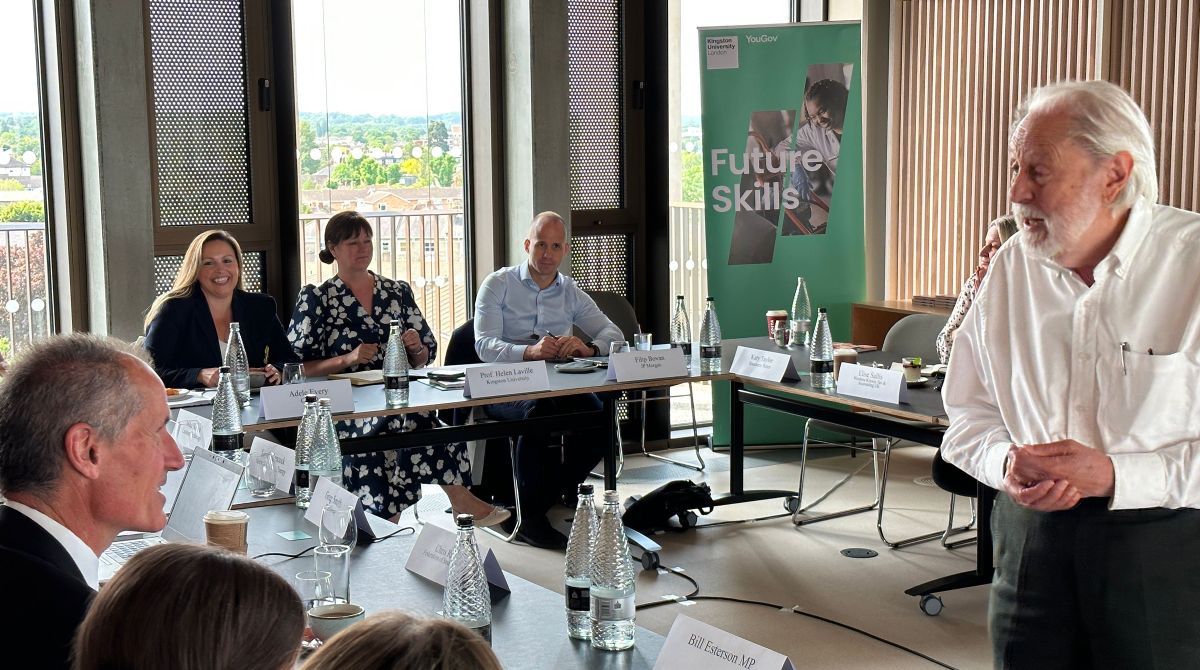Kingston University hosts future skills roundtable with Shadow Minister for Business and Industry, filmmaker Lord David Puttnam and business leaders from across economy
Posted Wednesday 7 June 2023

The key role that future skills will play in supporting the United Kingdom's economic growth was outlined during a roundtable event that brought together key figures from industry, politics and education at Kingston University.
Business leaders from a range of sectors came together to discuss the country's skills needs and hear from Shadow Minister for Business and Industry Bill Esterson MP, filmmaker Lord David Puttnam and Kingston University Provost Helen Laville. The roundtable was followed by a wide-ranging discussion that set out the challenges firms face in meeting skills gaps and how best to ensure employees are able to adapt and thrive in a rapidly changing and evolving world.
Representatives from the worlds of technology, communications, banking and finance, including Barclays, Cisco, and the Federation of Small Businesses attended the event, organised as part of the latest phase of Kingston University's sector-leading Future Skills campaign. The institution has been championing the importance of ensuring graduates across the sector are equipped with the future-proofed skills needed to secure the long-term economic success of the UK.
Last year, a report commissioned by the University with YouGov that polled 2,000 businesses and 1,000 students found that problem solving, critical thinking, communication, adaptability, and creativity were among the core skills most valued by employers. From this September, the University will be rolling out the teaching of these future skills across the curriculum as part of a progressive new model of education.
Making sure young people were supported to develop such skills was of critical importance, Shadow Minister for Business and Industry Bill Esterson MP said. "Kingston University's Future Skills programme quite rightly makes the point that core skills, life skills, enabling young people to be ready for the worlds of life and of work are fundamental to the future success of our country and of our economy," he said.
"Today's discussion was really important in understanding from businesses across the economy just what the challenges are, as well as sharing Labour's plans for an industrial strategy and to invest in resolving the challenges with the apprenticeship levy as it stands now."
Mr Esterson endorsed a key message from Lord Puttnam's presentation, in which the filmmaker set out how skills and growth were inextricably linked. The Oscar-winning producer and chair of online education company Atticus Education highlighted the importance of ensuring government, educators and business worked together to solve they country's skills gap - one of the key recommendations in the University's latest future skills report.
"We have a collective problem and that problem is not going to solve itself," he said. "In the end, I think it's going to be solved by the education sector, but government has got to work with it and make sure that the people that are coming through the entire system are provided with the skills they need for the late 21st century."
Kingston University Provost Helen Laville welcomed the contributions of all those who took part in the roundtable, detailing how such discussions would feed into the development of future skills teaching across the University curriculum. "For this work to be successful we have to listen to businesses and policymakers and also share with them why we think the future skills agenda is so essential," she said. "Their input and direction on what skills young people will need for industry, for the economy, for our cultural sectors and for their own career success is invaluable."
- Read more about Kingston University's Future Skills campaign
Contact us
General enquiries:
Journalists only:
- Communications team
Tel: +44 (0)20 8417 3034
Email us



